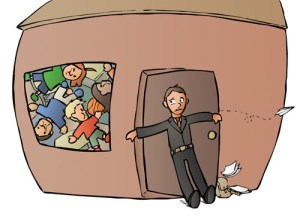 Ninety days ago, I was convinced that I was doing something wrong. I was once again struggling with my faith–not in God–but with the bible. I just couldn’t make myself believe that it was the inerrant word of God, or the word of God at all. It seemed full of contradictions, there was no original text to track changes, and even if there was an original, it wouldn’t prove it was true, just old. Many things seemed to contradict what we know from science, but most of all, God did not seem like a perfect and divine being to me. He seemed like a man, a man created by a patriarchal culture, a flawed man, who valued vengeance and demanded worship to feed a man-sized ego that seemed to go against my idea of an all-powerful perfect and good god. Not only that, the god of the bible seemed to contradict himself. He demanded things from us that he did not deliver on himself, namely humility and mercy. He also created imperfect beings, gave them free will, and then demanded that they “freely” obey him, accept him, believe in him, or be punished.
Ninety days ago, I was convinced that I was doing something wrong. I was once again struggling with my faith–not in God–but with the bible. I just couldn’t make myself believe that it was the inerrant word of God, or the word of God at all. It seemed full of contradictions, there was no original text to track changes, and even if there was an original, it wouldn’t prove it was true, just old. Many things seemed to contradict what we know from science, but most of all, God did not seem like a perfect and divine being to me. He seemed like a man, a man created by a patriarchal culture, a flawed man, who valued vengeance and demanded worship to feed a man-sized ego that seemed to go against my idea of an all-powerful perfect and good god. Not only that, the god of the bible seemed to contradict himself. He demanded things from us that he did not deliver on himself, namely humility and mercy. He also created imperfect beings, gave them free will, and then demanded that they “freely” obey him, accept him, believe in him, or be punished.
Furthermore, it really bothered me that it blatantly states many places in the bible that God causes certain people to not believe; he closes their eyes and hearts to the truth, so they cannot receive him and salvation. How is that free will? And how is that fair? Supposedly, he then uses them to fulfill his purposes. Not only does this seem unfair, it seems downright evil. But because I believed God had revealed to me his existence, I thought it must be me. I’m not praying enough, or I have unconfessed sin, or I don’t have enough faith because I don’t read the bible enough, everything that most churches will tell you that you need to do in order to develop a close relationship with Christ. I have been told that I over-think everything, and I shouldn’t expect to understand it all. So I decided to do everything I could to do what was supposed to help me believe and have the right attitude. I committed to spending ninety days with God, praying, asking for faith, asking for God to reveal truth to me, reading the bible, journaling about what I read, and worshiping with music and meditation. Today I completed that commitment.
Every day I started by asking forgiveness for my unbelief and by praying Psalms 51:10-11, which says, “Create in me a clean heart, O God,
And renew a steadfast spirit within me. Do not cast me away from Your presence,
And do not take Your Holy Spirit from me” (NKJV). I prayed for God to work in my heart, help me to understand what was illogical to me or make me not care that certain things didn’t make sense to me, to soften my heart toward the scripture. In short, to have faith, and I was sincere.
I began reading the New Testament in Matthew and read through Acts. Everyday I would read a chapter or more, continuing until coming to a logical place to stop in the narrative, or slowing down when I required more thought on a passage. I would highlight it, meditate on it, pray for understanding, and then journal my thoughts and a prayer or two to God. I would end with another similar prayer, but more personal. Later in the day, I would listen to praise music and worship along with it.
When I first made this commitment, I honestly thought to myself that this was my last chance. I had devoted hours, days, and weeks to reading theology, bible commentary, listening and calling into Christian talk shows, and looking for answers to questions I didn’t understand. I thought if this didn’t work, I was done. I would devote no more of life to searching in vain. The first few weeks were hard. I didn’t want to do it, I dreaded it, and I even had nightmares about the church being a cult that I needed to escape. Some people said this was a spiritual attack, and others said it was my subconscious telling me what I really thought about the religion.
Previously, I had always thought that most of my problems were with the Old Testament-version of God. He is the one who commanded that whole races be wiped out, including small children and people who had nothing to do with whatever the rest were guilty of. He was the one who said to stone children who disobeyed, kill homosexuals, and plunder villages, leaving no one alive. But while reading the New Testament, I saw similar contradictions. For one thing, Jesus, Paul, and the other apostles advocated for the behavior in the Old Testament and keeping the law. And then I read the story of Ananias and Sapphira in Acts 5:1-11. To paraphrase, the early church members sold their personal belongings and laid the proceeds at the apostles’ feet to distribute to anyone as they had need. Well, Ananias and Sapphira sold their land, and gave some of the proceeds to the church. Peter confronted them saying, “Ananias, why has Satan filled your heart to lie to the Holy Spirit and keep back part of the price of the land for yourself? While it remained, was it not your own? And after it was sold, was it not in your own control? Why have you conceived this thing in your heart? You have not lied to men but to God” (Acts 5:1-4, NKJV). Ananias, after hearing these words, fell down and died. Then Peter asked Sapphira if the amount they gave was the whole price they had received, and she lied, saying yes. Then Peter, knowing she lied, asked, “‘How is it that you have agreed together to test the Spirit of the Lord? Look, the feet of those who have buried your husband are at the door, and they will carry you out.’ Then immediately she fell down at his feet and breathed her last. And the young men came in and found her dead, and carrying her out, buried her by her husband. So great fear came upon all the church and upon all who heard these things” (Acts 5; 9-11, NKJV). Presumably, God struck them down for having an unfortunately natural human reaction. Yes, I realize that in Christianity, natural human reactions are sin, but if Ananias and Sapphira would have been given a minute to think about it, feel guilty about it, they most likely would have changed their minds and given it all. I mean, they didn’t have to give any of it, so they obviously believed in the cause, but the normal human reaction is to be afraid, afraid to give up everything and trust. If they were condemned for a momentary lapse of trust, then we are all doomed.
Whenever I’ve heard this story taught in church, the pastor always emphasizes that Ananias and Sapphira lied to God, not just men, and it wasn’t about the money, and God knew their hearts. So what? Does that make it right? Does that mean they deserve to be struck dead? I’ve always had a problem with a major tenet of the Christian religion–the idea that because we are all sinners, we deserve to go to everlasting punishment. I agree, no one is perfect. No one is worthy–wait, worthy of what? Heaven? Life? In the bible punishment for sin is death. Okay, that seems reasonable in some cases, maybe. But flaming torment forever? I don’t believe anyone deserves that. To me that sounds like a human invention, an angry vengeful, wronged, and bitter human answer to taking care of people who do things they don’t like. So, I don’t care if it was about the money or lying to God or being selfish or lacking faith. They didn’t deserve it. And I don’t believe a loving father-God makes examples out of his children, so others will learn. Would you let one of your children step in front of a speeding vehicle, so the rest of your children will learn to look both ways? I long for answers, but everywhere the answers are shallow, don’t make any sense, or just fall way too short of logic. You may be thinking, and I’ve been told this many times, that I am arrogant, thinking my idea of right and wrong, good and evil is right or better than God’s. I do rely on my moral judgement and inner conscience to determine right and wrong, but we all do; we don’t really have a choice unless we choose to blindly accept what anyone tells us. Christians do this when they choose to believe in Christianity rather than Buddhism or Islam or anything else. It seems morally right or better to them. The idea of the Christian god lines up with their moral judgements about who God should be better than other religions, and as it turns out, I think I am more moral than the god of the bible.
I continued reading, praying, and worshiping anyway, but my heart moved further and further from God. Did I even want to believe this stuff? The miracles didn’t bother me. If God created the world, then he could part the Red Sea, but the fact that he doesn’t obviously reveal himself to most of the world makes me wonder, makes me doubt. Doesn’t he want everyone to believe if there is really eternal torment at stake? Why the big game of hide and seek? The stock answer from Christians is faith. But if God felt it no problem to reveal himself to the Old Testament people, why not us? Why are we expected to believe on less evidence than them? Why the rule change? We need to believe without seeing, but they didn’t? Wait, I thought God doesn’t change? He seems to change a lot between the Old and New Testaments, but not enough. Just about as much as the culture had changed–hmmm, I was beginning to see why.
The other stock answer is free will. But this also makes no sense. Satan supposedly knows who God is, has personally met him, knows his power and his reported goodness, but he was still able to reject God, so the free will argument does not work. Theoretically, God could step out of the sky and introduce himself, and we could still reject him. So why not? Where is he hiding?
Another disturbing thing to me is the magnitude of contradictions in the bible about the basic tenets of salvation. Every religion claims to know exactly what, as Paul puts it, is the “Way” to salvation, but how could they, when it is not at all clear in the scriptures? For example, and I could give you many, it says in Acts 2:38, “Then Peter said to them, ‘Repent, and let every one of you be baptized in the name of Jesus Christ for the remission of sins; and you shall receive the gift of the Holy Spirit’” (NKJV). Catholics believe we have to be baptized to be saved, and Protestants believe it is by faith alone we are saved, and baptism is merely a symbolic gesture, part of the public profession of faith. When I ask Protestant Christians about this, I always get referred to a different part of scripture that says the opposite. But that only proves it’s contradictory, not which way is right. The very fact that it is contradictory may point to none of it being right.
Then the other thing that many Christians disagree about, but seem to think is really a non-issue, is the idea of predestination or Calvinism–that God chooses to whom he will give knowledge and faith, and who will be saved. Here is one verse among many that supports that: “Therefore they could not believe, because Isaiah said again: ‘He has blinded their eyes and hardened their hearts,
Lest they should see with their eyes,
Lest they should understand with their hearts and turn,
So that I should heal them’” (John 12:39-40). Verses like this made me think that I must be one of those people that God blinds because no matter what I do, I doubt. But then there are verses like John 3:16: “For God so loved the world that He gave His only begotten Son, that whoever believes in Him should not perish but have everlasting life” (NKJV). Again, this doesn’t prove anyone can be saved; it just proves the bible contradicts itself, and no one, no matter what they say, can know the true “Way.” By the way, if I am one of these people God blinds just to send to hell, even though I earnestly and honestly sought him–well, that’s a pretty sick game to play with people he supposedly loves. Another example of the character of “God.”
Now some Christians say that this is not important; we can go on regardless of which way it is, but I can’t see how. If the bible contradicts itself, it cannot be trusted, so therefore, all of it is in question. I do see obvious moral lessons and wisdom from some parts of the bible that are valuable, as I do with the wisdom of many religions, but I cannot base my beliefs on it, especially when so many things in it contradict my own internal moral values, things like God ordering the killing of entire groups of people because some of them have rebelled, or raping and pillaging, subjugating women, or condemning homosexuals for feelings they did not choose. The more I study the bible, the more it seems like merely a book written by very flawed and prejudiced individuals with no knowledge of science, sometimes good, sometimes helpful, often not, very often damaging to society.
So the conclusion of my ninety days with God is that I don’t believe I was spending time with a god at all when I was studying the bible. I don’t know if there is a god or not. Maybe there is a creator who put things in motion and had a plan for us, maybe that plan involves us learning to love each other and to live in peace with each other on our own. Not so much a creator who is pulling the strings of our daily lives, shutting the hearts of certain men to use as villains in his master plan, not so much condemning us for doing what comes naturally, but one that put a higher calling inside of us, an altruistic impulse that causes us to become more than we what we are, that inspires me to be more than just me. Or more likely, this impulse evolved as helpful trait for community survival. I don’t know if a god set the world in motion and left us to learn these lessons on our own and evolve into a better human race, or maybe there is a creator who is not good at all. Maybe he created life and then left us to evolve on our own, no not involved in the details of our lives at all. But I can’t know if any of this is true, and neither can anyone else. In fact, the more I study science, and evolution, in particular, the more I doubt that there is any creator at all. And if there is, who cares? It doesn’t seem to affect my daily experience. I see no evidence that there is one, so I should live as if there is not one.
I, however, am not a relativist. I do believe there is an absolute truth, and this truth exists whether or not we know what it is. But I don’t believe anyone who says they do know it, and I don’t believe this truth is found in the bible. I am only capable of judging things by my own carefully constructed standards, the same as everyone else. I think that Christians who accept the bible’s morality do so because it already agrees with their own internalized morality, so it seems right to them. Or they haven’t read the bible and are just going by the nice ideas they’ve heard are in there. Or they are so indoctrinated from years of living in a Christian culture that they just don’t recognize how abhorrent the bible is.
Finally, I don’t need or want a reward for being good, and neither do I deserve to go to hell for being human. I’ve come to terms with this. I may be wrong. If I am wrong, then there’s nothing I can do about it. I can’t make myself believe something I don’t, and I’ve decided that even if I did believe it, I wouldn’t follow the evil god depicted in the bible. I feel like these past ninety days was me trying to brainwash myself into believing again, and it wouldn’t work because once I woke up and realized that the bible is just a flawed book, I couldn’t un-know it. I’m breaking free of the cult of religion once and for all. (By the way, I believe my dreams were my subconscious mind telling me what I believed all along.) From now on I will live as the free person I am, free to be good without god, and determining how I can make the world a better place for me and everyone else, especially since this is likely the only life we will ever know. It’s even more reason to live a good life now and enjoy it without all the stress of making sense of something that makes no sense. So, the result of my 90 days with “God” is that I found out there is nothing wrong with me. I have just awakened to reality. If you are a believer, I highly recommend spending your own 90 days getting to know your “God.” You may be surprised at what you find.–Christina Knowles
Originally posted in 2013



 Today was Inauguration Day for Joseph R. Biden and Kamala Harris, a day overshadowed by the threat of violence and the realization of how close we came to losing our democracy. Of course, I expected to be joyful and relieved on such a day. What I didn’t expect was to be reduced to an emotional puddle of tears at the mention of each seemingly normal act throughout the day.
Today was Inauguration Day for Joseph R. Biden and Kamala Harris, a day overshadowed by the threat of violence and the realization of how close we came to losing our democracy. Of course, I expected to be joyful and relieved on such a day. What I didn’t expect was to be reduced to an emotional puddle of tears at the mention of each seemingly normal act throughout the day.
 We all know that Donald Trump lacks the basic qualifications to be president—intelligence, thoughtfulness, reflection, kindness, compassion, empathy, humility, morality, and human decency. We know he is a racist, a misogynist, an alleged rapist, a coward, and a liar. We also know that he is a business failure and a criminal, but now we have the documents that could prove it. The IRS has bought down many powerful men who committed tax fraud, so it shouldn’t be hard to bring down a petty and unintelligent character like Trump.
We all know that Donald Trump lacks the basic qualifications to be president—intelligence, thoughtfulness, reflection, kindness, compassion, empathy, humility, morality, and human decency. We know he is a racist, a misogynist, an alleged rapist, a coward, and a liar. We also know that he is a business failure and a criminal, but now we have the documents that could prove it. The IRS has bought down many powerful men who committed tax fraud, so it shouldn’t be hard to bring down a petty and unintelligent character like Trump.




 Where do I start? It’s been a busy year, probably the most eventful year I’ve had in over ten years. Let’s see, I studied Spanish and math, math very extensively and not my best subject. I took the five-hour WEST-B test and got my Washington and Oregon state teaching licenses and set out to find our new home.
Where do I start? It’s been a busy year, probably the most eventful year I’ve had in over ten years. Let’s see, I studied Spanish and math, math very extensively and not my best subject. I took the five-hour WEST-B test and got my Washington and Oregon state teaching licenses and set out to find our new home. Through some connections with some wonderful people, I’ve been able to begin living the life I imagined. I now work at home. I have several different gigs—one for a company that’s very steady and has benefits, another that is regular and part-time but wonderfully creative, and the others are creative and sporadic. I’m a freelance writer and editor, I work at home with my dog and cat next to me, and I decide when and where I work. I never wake up to an alarm anymore. I wake up naturally with the sun. Sometimes I work in my pjs, sometimes I clock out for lunch and take a walk among the beautiful trees in Oregon, and go home refreshed to finish working. I take the same days off my husband does, so we can go to the beach, the mountains, or the falls, or just sit around together, watching movies. I may not do this forever, but for now, it’s given me the chance to settle in and get to know Oregon.
Through some connections with some wonderful people, I’ve been able to begin living the life I imagined. I now work at home. I have several different gigs—one for a company that’s very steady and has benefits, another that is regular and part-time but wonderfully creative, and the others are creative and sporadic. I’m a freelance writer and editor, I work at home with my dog and cat next to me, and I decide when and where I work. I never wake up to an alarm anymore. I wake up naturally with the sun. Sometimes I work in my pjs, sometimes I clock out for lunch and take a walk among the beautiful trees in Oregon, and go home refreshed to finish working. I take the same days off my husband does, so we can go to the beach, the mountains, or the falls, or just sit around together, watching movies. I may not do this forever, but for now, it’s given me the chance to settle in and get to know Oregon.









Recent Comments